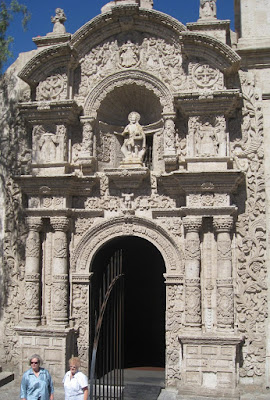God has worked in my life by many means over the years. Concerts and conferences like Ichthus and Urbana. “Spiritual days” in my ministry training years, not to mention daily prayer and Bible reading, of course. Books by authors like Eugene Peterson and Henri Nouwen. Retreats at the Abbey of Gethsemani. And many more.
But among the most impactful means of God’s grace to me has been the pilgrimages Robin and I have taken to the Holy Land. Our first was in 1987, when we borrowed money to make the trip, believing that initial investment would pay rich dividends in our years of ministry to follow--and it did.
There is no way to adequately describe the difference in perspective, appreciation, and understanding a person gets from discovering the land of Jesus, the apostles, prophets, and patriarchs. It is like the difference between reading about being born again...and BEING born again. It is such a big deal that I honestly believe every pastor should go to Israel, at least once, and as early as possible in his or her ministry.

Words cannot describe what happens to your Bible reading, studying, and preaching once you have sailed the Sea of Galilee, and been baptized in the Jordan. Or prayed in the Garden of Gethsemane and celebrated communion outside the Garden Tomb. Or taken an early morning journey starting at the Gihon Spring, in the City of David, and traversing the actual tunnel of Hezekiah (dug underneath the Ophel in Jerusalem about 701 B.C.) and ending up at the Pool of Siloam. Or the side trip Robin and I and a half dozen good friends took our last morning in Jerusalem, when we took a cab to the village of Bethany, and walked the Palm Sunday route Jesus took from the traditional site of Lazarus’s tomb to the Temple Mount (see photo above). The topography and scenery of that three-mile walk will stay with me forever, and springs to my mind, of course, every time I read of Bethany or Palm Sunday or Lazarus, Mary, and Martha in my Bible.

You can't imagine the way Scripture and the past come alive after you have stood on the teaching steps of the Jerusalem Temple (on which Jesus’ feet undoubtedly trod, and where he would have sat to teach on many occasions) (see photo above).

And there's just no way to convey the depth and emotion of such statements as "Our feet are standing in your gates, O Jerusalem" (Psalm 122:2) and "Those who trust in the Lord are like Mount Zion" (Psalm 125:1) and "the city of our God, the mountain of his holiness" (Psalm 48:1) until you've encountered such things in the very places the Biblical writers experienced them. It is, for me, an indescribably rich experience that is renewed every time I read such passages.

And now we are excited at the prospect of another such experience—with an added twist—in early 2010. Leaving from Dayton, Ohio, on January 24, 2010, we will be flying to the Kingdom of Jordan, where we will begin our tour with a trip to the “Lost City” of Petra (above), the city cut out of rock by the Nabateans around 100 B.C., memorably shown in the movies
Indiana Jones and the Last Crusade and
Left Behind, among others. From Petra we will visit the ancient city of Jerash and cross the Jordan into Israel, where our Holy Land trip will include visits to Bethlehem, Nazareth, the Sea of Galilee, Jericho, Jerusalem, Caesarea, Capernaum--and much more--and includes an optional seven day extension to Egypt!
For all the richness of my educational and training experiences to date, I rank our trips to Israel as the most transformative of my ministry. They have made me a better reader, student, and preacher and teacher of Scripture. They have been worth many, many times the money I've spent on them. And I gain so much from every trip that I immediately make the next trip a high priority.
Our future plans are to make a "Journeys of Paul Cruise" in March 2012, and then again in 2014 to return to the Holy Land. If you haven't yet made either of those trips, consider making it with us! More information is available
here.
 This chapel, designed by Claudio Baladron and Diego Grass, is in the countryside of Southern Chile. It is a wooden barn structure over a concrete platform with corrugated metal cladding in the outside and pine boards in the inside.
This chapel, designed by Claudio Baladron and Diego Grass, is in the countryside of Southern Chile. It is a wooden barn structure over a concrete platform with corrugated metal cladding in the outside and pine boards in the inside.

 Simply beautiful.
Simply beautiful.









































